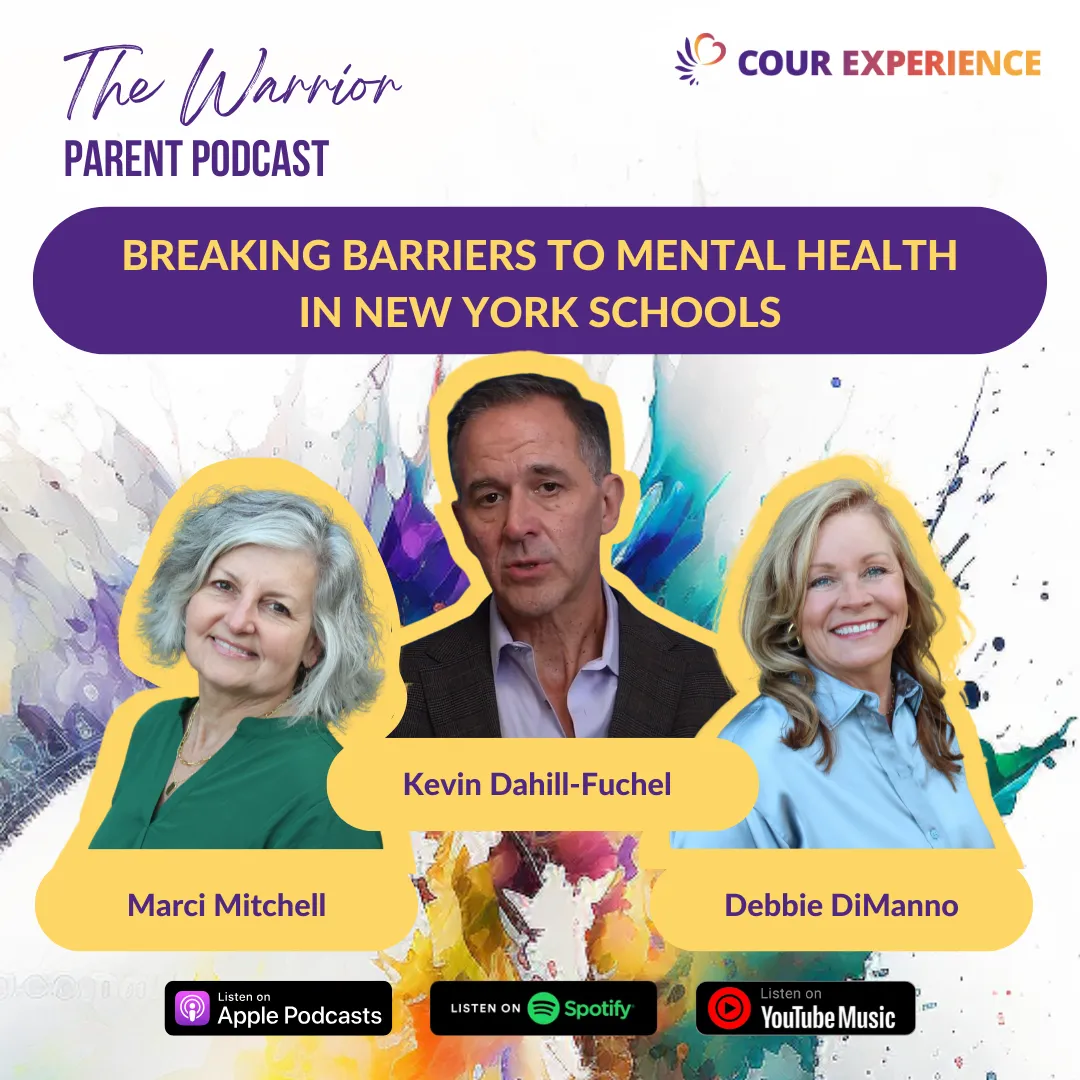THE

PARENT PODCAST
Breaking Barriers to Mental Health
in New York Schools
with Kevin Dahill-Fuchel

Key Points
From This Episode:
01:57 - Schools as Centers of Healing
10:17 - From ACEs to SDQs: Strengths-Based, Scalable Support
21:18 - Belonging, SEL, and Building Well Villages
Resources from
this episode:
Show Notes
In this episode, Marci and Debbie talk with Kevin Dahill-Fuchel, Executive Director of Counseling in Schools (NYC), about building school communities that heal and support kids, educators, and families. Kevin shares why CIS moved from ACEs screening to the strengths-and-difficulties questionnaire (SDQ), how a strength-based, community-centered model improves access and engagement, and why staff wellness must be redefined as collective care. They also explore SEL without the politics, post-COVID social anxiety, and New York’s new in-school device policy—offering practical ways schools can foster real belonging, collaboration, and healthier social environments.
Schools as Centers of Healing
Marci and Debbie sit down with Kevin Dahill-Fuchel to explore how New York City schools are becoming hubs for healing, connection, and community care. With more than 30 years of experience, Kevin shares CIS’s evolution from a clinic-adjacent, insurance-dependent model to grant-funded, school-embedded services that reduce barriers to access. He reflects on pivotal moments—from Columbine and 9/11 to Superstorm Sandy and COVID—that reshaped the city’s approach to mental health in schools, and explains why meeting families and educators where they are is essential. The conversation centers on relationship-building with school leaders and communities, and the strength-based question that guides their work: What’s going well here—and how can we get more of it?
From ACEs to SDQs: Strengths-Based, Scalable Support
Diving into assessment and intervention, Kevin explains why CIS moved beyond the ACEs framework for schoolwide screening and adopted the Strengths and Difficulties Questionnaire (SDQ). The SDQ captures three perspectives—student, caregiver, and teacher—highlighting both strengths and needs while avoiding the overwhelm that can come from uncovering deep trauma outside a therapeutic container. Post-COVID, Kevin notes a significant rise in social anxiety and a shared sense of vulnerability among students and educators. CIS is expanding professional development, reframing self-care as community care, and giving teachers and administrators practical tools to create collective wellness. The goal: engagement first, healing second—because meaningful change starts with connection.
Belonging, SEL, and Building Well Villages
The hosts and Kevin tackle the politicization of social-emotional learning (SEL) and reframe it as the intentional cultivation of emotional well-being and social skill development—outcomes that occur in every school whether we guide them or not. They discuss New York’s new policy restricting internet-enabled devices in schools, intended to reduce distraction and encourage real-world socialization, while emphasizing the need for positive messaging and staff modeling. Throughout, Kevin champions belonging as a core outcome of education and urges curiosity over judgment in policy debates. Listeners can explore free CIS resources—like classroom conversation starters—on the organization’s website, and check out the CourTools app for daily mind-body practices. The episode closes with an invitation to join the From Chaos to Calm: A Sanctuary for Moms community and continue building “well villages” where kids, families, and educators thrive together.
Thank you so much for listening to this episode! This podcast is dedicated to supporting families through the ups and downs of parenting and mental wellness. We know how tough it can be to raise kids in today’s world, but you don’t have to do it alone. Join us and let’s lift each other up.
With love,
Marci & Debbie
THE

PARENT PODCAST
Breaking Barriers to Mental Health in New York Schools
with Kevin Dahill-Fuchel

Show Notes
In this episode, Marci and Debbie talk with Kevin Dahill-Fuchel, Executive Director of Counseling in Schools (NYC), about building school communities that heal and support kids, educators, and families. Kevin shares why CIS moved from ACEs screening to the strengths-and-difficulties questionnaire (SDQ), how a strength-based, community-centered model improves access and engagement, and why staff wellness must be redefined as collective care. They also explore SEL without the politics, post-COVID social anxiety, and New York’s new in-school device policy—offering practical ways schools can foster real belonging, collaboration, and healthier social environments.
Key Points
From This Episode:
01:57 - Schools as Centers of Healing
10:17 - From ACEs to SDQs: Strengths-Based, Scalable Support
21:18 - Belonging, SEL, and Building Well Villages
Schools as Centers of Healing
Marci and Debbie sit down with Kevin Dahill-Fuchel to explore how New York City schools are becoming hubs for healing, connection, and community care. With more than 30 years of experience, Kevin shares CIS’s evolution from a clinic-adjacent, insurance-dependent model to grant-funded, school-embedded services that reduce barriers to access. He reflects on pivotal moments—from Columbine and 9/11 to Superstorm Sandy and COVID—that reshaped the city’s approach to mental health in schools, and explains why meeting families and educators where they are is essential. The conversation centers on relationship-building with school leaders and communities, and the strength-based question that guides their work: What’s going well here—and how can we get more of it?
From ACEs to SDQs: Strengths-Based, Scalable Support
Diving into assessment and intervention, Kevin explains why CIS moved beyond the ACEs framework for schoolwide screening and adopted the Strengths and Difficulties Questionnaire (SDQ). The SDQ captures three perspectives—student, caregiver, and teacher—highlighting both strengths and needs while avoiding the overwhelm that can come from uncovering deep trauma outside a therapeutic container. Post-COVID, Kevin notes a significant rise in social anxiety and a shared sense of vulnerability among students and educators. CIS is expanding professional development, reframing self-care as community care, and giving teachers and administrators practical tools to create collective wellness. The goal: engagement first, healing second—because meaningful change starts with connection.
Belonging, SEL, and Building Well Villages
The hosts and Kevin tackle the politicization of social-emotional learning (SEL) and reframe it as the intentional cultivation of emotional well-being and social skill development—outcomes that occur in every school whether we guide them or not. They discuss New York’s new policy restricting internet-enabled devices in schools, intended to reduce distraction and encourage real-world socialization, while emphasizing the need for positive messaging and staff modeling. Throughout, Kevin champions belonging as a core outcome of education and urges curiosity over judgment in policy debates. Listeners can explore free CIS resources—like classroom conversation starters—on the organization’s website, and check out the hosts’ CourTools app for daily mind-body practices. The episode closes with an invitation to join the From Chaos to Calm: A Sanctuary for Moms community and continue building “well villages” where kids, families, and educators thrive together.
Thank you so much for listening to this episode! This podcast is dedicated to supporting families through the ups and downs of parenting and mental wellness. We know how tough it can be to raise kids in today’s world, but you don’t have to do it alone. Join us and let’s lift each other up.
With love,
Marci & Debbie
© 2019 Cour Experience Inc. All Rights Reserved.
Non-Profit 501c3 EIN: 84-3383699
© 2019 Cour Experience Inc. All Rights Reserved.
Non-Profit 501c3 EIN: 84-3383699








